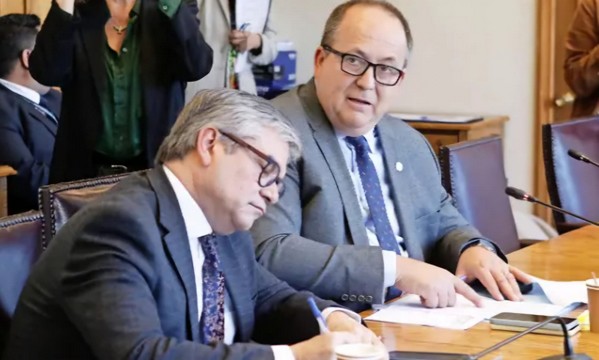The reduction "compromises its investigative capacity," sources told "El Mercurio," while consulted lawmakers consider it a "mistake" that must be reversed.
Congress views the $7.064 billion cut to the Public Ministry's budget, decreed by the Government, as nonsensical and an imminent institutional risk. This comes amid a security crisis where the prosecution is supposed to be a key player against rising crime—a scenario where budget adjustments don’t fit, lawmakers argue.
The resource reduction is part of a broader $544 billion cut announced by the Executive Branch, stemming from a protocol agreement signed during the mixed Budget Committee debate to reach a consensus and unblock the approval of fiscal allocations for 2025.
In detail, the "negative" impact of the cut on the Public Ministry, as reported by "El Mercurio," affects three critical areas: first, the pursuit of organized crime and high-complexity offenses, due to the inability to replace prosecutors and staff. This stems from reduced resources in Line Item 23 of the Public Ministry, specifically Subheading 21, undermining investigative capacity, courtroom coverage, and causing delays in case processing while weakening operational effectiveness in strategic investigations. The lack of adequate personnel, worsened by lost funding for fees, will severely limit handling high-impact cases, it was warned.
Second, in technology, cuts to goods and consumer services under Subheading 22 would hinder the implementation of essential tools to combat emerging criminal trends. The lack of budget for installing traceability software on Public Ministry computers complicates preventing leaks of sensitive documents, exposing critical investigations to security risks and compromising evidence confidentiality. This technology, currently in pilot phase, was slated for institution-wide rollout in 2025, and its absence will cripple capabilities to tackle complex crimes like organized crime, cybercrime, corruption, data trafficking, and transnational illicit networks.
The third impact—highlighted as the gravest risk—is on the protection of prosecutors and Public Ministry personnel. Reductions in Subheadings 29 and 22 directly impair acquiring and maintaining vital equipment like surveillance cameras, bulletproof vests, and vehicle protection. In a context where prosecutors face growing threats for their role in organized crime investigations, the lack of security measures increases exposure to potential attacks and retaliation.
List of Exemptions
One criticism is that the Government’s agreement protocol with the mixed committee did not exempt the Public Ministry from cuts, instead sparing only a limited group of entities, such as health services, Carabineros and Investigaciones police forces, Gendarmería, the school system, housing concessions, and subsidies.
While the cuts were expected, Congress assumed the approach would be differentiated, sparing sensitive institutions like the Public Ministry. Even Deputy Jaime Araya (ind.-PPD) argues, "This cannot proceed; if we must choose between funding polls or criminal prosecution, the answer is obvious." He urged convening a joint session of the Security and Finance Committees to analyze the implications.
Source:El Mercurio







Comentarios (0)
No hay comentarios aún. ¡Sé el primero en comentar!
Deja un comentario